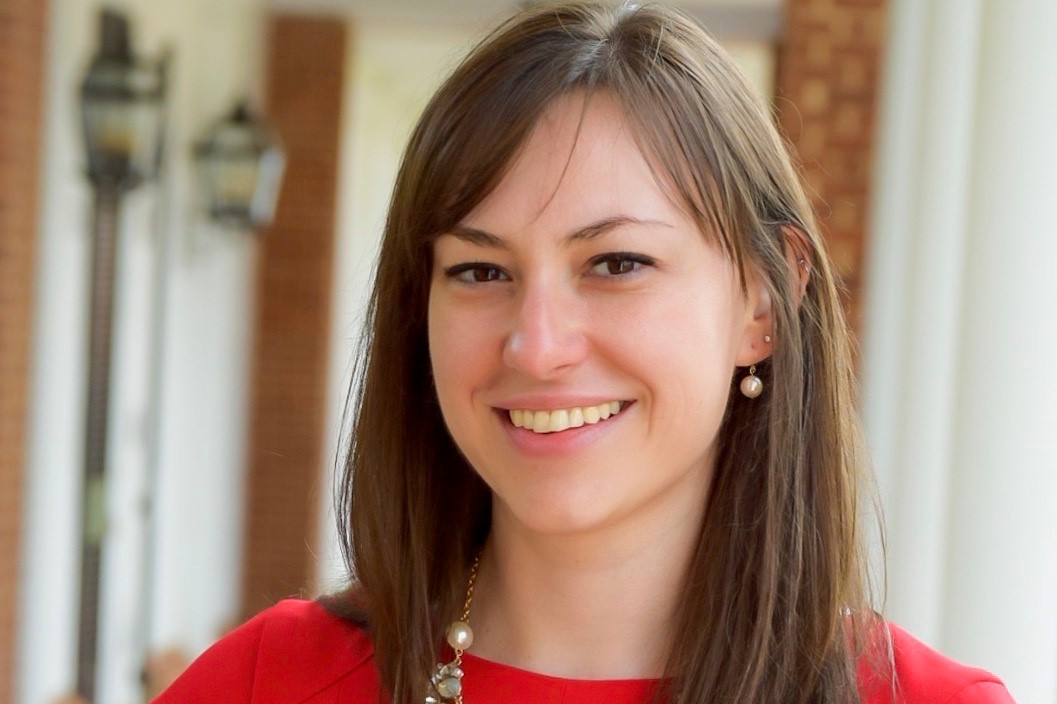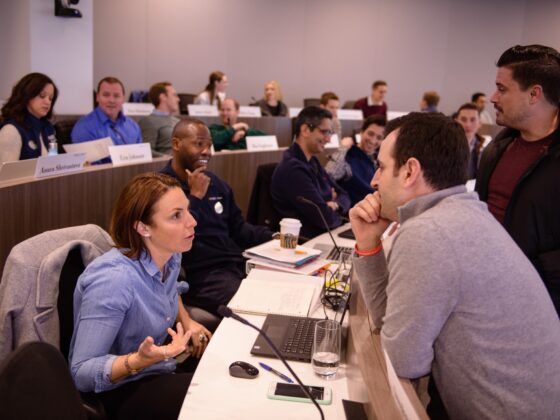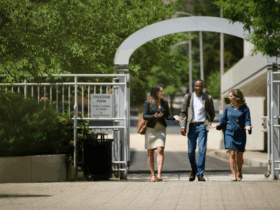Jess Lukacs (MBA ’19) originally hails from Reston, Virginia. Prior to Darden, she graduated with a Bachelor of Arts from Rutgers University in 2013, having earned a double major in economics and cell biology and neuroscience. She then went on to earn her Doctor of Medicine from the University of Virginia School of Medicine in 2017. As a medical student, Jess served in numerous roles on the medical school’s elected leadership board, the Mulholland Society, including as the student body president in her fourth year. She also served on University Student Council as the School of Medicine representative in her third and fourth years, chairing the Graduate Affairs Committee in her fourth year.
You had the unique experience of being part of Darden’s full-time MBA and Executive MBA. What do you see as the benefits of each format?
I initially chose Darden’s full-time program because of several benefits it offered. I applied to medical school already knowing I eventually wanted to get an MBA. Toward the end of med school, I became somewhat of a career-switcher looking for health care opportunities outside of clinical practice. So, from a career perspective, pursuing both programs in medicine and business on-Grounds made the most sense.
The full-time program has incomparable access to on-Grounds recruiting and networking. While the EMBAs do have high quality career development resources (not to mention each other) at their disposal, the full-time MBAs can go directly from class to networking events or job interviews. It’s not uncommon during interview season for over half of the section to be sitting in the classroom in suits! From a social perspective, having been heavily involved within the broader UVA community before coming to Darden, I was able to continue engaging in that fulfilling part of my life and educational experience.
From an academic perspective, the full-time program has a wider variety of course offerings. Although the required core classes are mostly the same between programs, there are fewer electives from which EMBAs can choose in their second year. For those interested in obtaining functional concentrations along with the degree — such as in corporate finance, strategy consulting, business analytics or global business — a full-time MBA would provide more comprehensive study of these individual topics.
The biggest benefit I’ve found in the Executive MBA program has been the flexibility to manage my personal life while getting back into an academic setting. My mother passed away from complications secondary to cancer while I was working at my summer internship in 2018. Unfortunately, my father has become ill as well, so my life has been completely upended. After taking a leave of absence in the fall of Second Year, I resumed classes in spring, but needed versatility that returning to Charlottesville full-time just wouldn’t allow. By no means has being in the exec program been easy, though! I’ve been equally as busy traveling once a month for classes spanning over four consecutive days and having online classes in between. The difference is that after an exhausting (and fun) Darden weekend, I could return to the part of my life that hadn’t stopped while I was in class. I wouldn’t have had this invaluable experience without the support of the amazing Darden staff, especially Sarah Elliott at the Office of Student Affairs and Terri Smith in the Registrar’s Office!
What did you enjoy about your full-time experience? What did you enjoy about your exec experience?
When I started in the full-time program, I had the unique experience of going to school with my brother, Matt Lukacs (MBA ’18), who started at Darden the year before I did. While I was still a med student, he and his classmates were a huge influence on my decision to attend Darden — the community was unparalleled. It didn’t hurt that I entered school already having won Darden Cup with Section A! Getting to continue my friendships with the Second Years when I was a First Year was incredibly valuable and enriching.
What I’ve enjoyed the most about the exec program has been the people. They are some of the most impressive, generous and motivated individuals I’ve ever been around. From the moment I walked into my first class, I was warmly welcomed. Thankfully, that feeling of belonging has yet to end! People have genuinely wanted to get to know me and make me feel included. It made me want to reciprocate and be the best classmate I could be. For every insightful comment made in class, I wanted to provide something equally as insightful. For each networking contact someone was nice enough to offer me, I wanted to pay it forward and give a networking opportunity to someone. It has also led to some unforgettable experiences! For example, I had a chance to join tours of the U.S. Capitol and the East Wing of the White House with EMBA classmates who work at each location serving as our tour guides. I even did the Capitol tour twice so that I could climb the dome the second time around. In the short semester I’ve been with this class, I’ve made some amazing memories and lifelong friends.
How were the formats similar? How were they different?
The First Year core curriculum is identical across formats, though classes are delivered differently. Both groups take courses such as Accounting for Managers, Marketing, and Financial Management and Policies. Electives are also similar in that courses offered to both full-times and execs cover the same material. Courses for both programs have the same number of class sessions per quarter, but to supplement not having as many on-Grounds experiences, executive format students also have online distance classes that meet between residencies.
The biggest differences I’ve appreciated, aside from the structural difference of weekend residencies for execs versus weekday classes for full-times, are in specific core requirements. While the full-times take more electives, the execs take additional core courses, such as two on-Grounds Leadership Residencies at the beginning and end of their experience. All EMBAs must also do at least one Global Residency, or all four if they are a GEMBA format student, while full-times have the option to take one or more Darden Worldwide Courses as electives. Additionally, the full-time program does not have classes over the summer, while the exec program does. However, despite the differences, I can testify that a Darden executive MBA is not a diluted full-time MBA. Everyone truly earns the same degree at Darden.
What about the classroom experience? How was it similar? Different?
The case method is the backbone of both formats. Although it was seamless to go from the full-time classroom to the exec classroom, some of the norms are slightly different. Coming from the full-time classes where hand-raising was the way to speak and talking out of turn was highly discouraged, the exec classes tended to be more conversational, but were in no way chaotic. The Executive MBA in-class discussions — facilitated by the same exceptionally talented faculty as the full-time program — are rich and engaging.
I think because most execs have worked for a longer period, they have unique experiences upon which to draw and that adds an additional depth to the conversation. Online distance classes were a big difference that took me some adjustment, though. And I still had to take a good number of cold calls, too. I found distance classes slightly less dynamic because of the virtual medium, but the learning element was certainly not lost.
How did the culture and community of the Executive MBA program compare to that of the full-time MBA program?
The culture for the full-time program is immersive. As a student, you are in class all day with your classmates, you have learning team four nights a week with your classmates, you attend networking functions with your classmates, you prepare for interviews with your classmates, you socialize with your classmates. I often found myself eating, sleeping and breathing Darden! This was especially true in the core curriculum, when most of the time was spent within our sections.
However, for anyone concerned about the sense of community in the exec format, the camaraderie in the Executive MBA program is extremely strong! I sincerely gush about how lucky I am to have met and learned alongside my new classmates. It feels like being part of a family; I often hear from my exec classmates that they’ve adopted me out from the full-time program! Getting to be a part of the exec program has been a truly transformative life experience for me. I only wish I had gotten to spend more time with them!
What advice would you have for someone facing a decision between the two formats?
I think choosing the “right” format depends a lot on life circumstances and maturity of the applicant. For some, it might be too disruptive to quit a great job, move a family to Charlottesville for two years, find a new job on top of the course load, and go wherever that job takes him or her. For others, it can be a welcome change to leave a current position, live in the most beautiful college town in the country that’s home to the 2019 NCAA basketball national champions, and then have absolute freedom to move on to the next adventure.
In my situation, having had my needs change while already enrolled, the dedicated folks at Darden have made sure I get the most out of my degree despite the circumstances. No matter which category someone falls into, a Darden MBA is attainable and a fantastic investment. And no matter which format, admitted students should prepare to spend two years with wonderful people who want to see them succeed!





